Related Research Articles
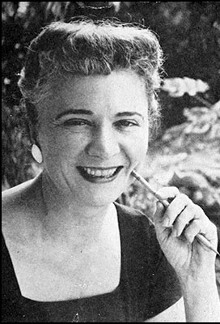
Catherine Lucille Moore was an American science fiction and fantasy writer, who first came to prominence in the 1930s writing as C. L. Moore. She was among the first women to write in the science fiction and fantasy genres. Moore's work paved the way for many other female speculative fiction writers.

James Benjamin Blish was an American science fiction and fantasy writer. He is best known for his Cities in Flight novels and his series of Star Trek novelizations written with his wife, J. A. Lawrence. His novel A Case of Conscience won the Hugo Award. He is credited with creating the term "gas giant" to refer to large planetary bodies.
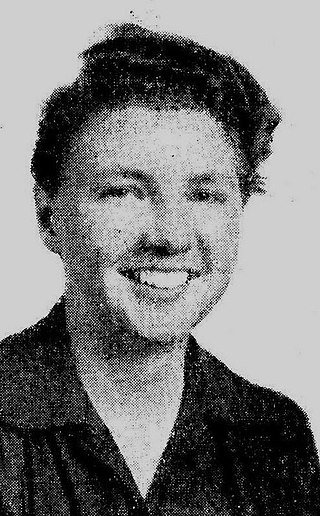
Leigh Douglass Brackett was an American science fiction writer known as "the Queen of Space Opera." She wrote the screenplays for The Big Sleep (1946), Rio Bravo (1959), and The Long Goodbye (1973). She worked on an early draft of The Empire Strikes Back (1980), elements of which remained in the film; she died before it went into production. In 1956, her book The Long Tomorrow made her the first woman ever shortlisted for the Hugo Award for Best Novel, and, along with C. L. Moore, one of the first two women ever nominated for a Hugo Award.
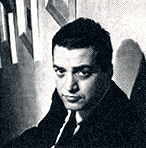
Alfred Bester was an American science fiction author, TV and radio scriptwriter, magazine editor and scriptwriter for comics. He is best remembered for his science fiction, including The Demolished Man, winner of the inaugural Hugo Award in 1953.

Eric Frank Russell was a British writer best known for his science fiction novels and short stories. Much of his work was first published in the United States, in John W. Campbell's Astounding Science Fiction and other pulp magazines. Russell also wrote horror fiction for Weird Tales and non-fiction articles on Fortean topics. Up to 1955 several of his stories were published under pseudonyms, at least Duncan H. Munro and Niall(e) Wilde.

The Magazine of Fantasy & Science Fiction is a U.S. fantasy and science-fiction magazine, first published in 1949 by Mystery House, a subsidiary of Lawrence Spivak's Mercury Press. Editors Anthony Boucher and J. Francis McComas had approached Spivak in the mid-1940s about creating a fantasy companion to Spivak's existing mystery title, Ellery Queen's Mystery Magazine. The first issue was titled The Magazine of Fantasy, but the decision was quickly made to include science fiction as well as fantasy, and the title was changed correspondingly with the second issue. F&SF was quite different in presentation from the existing science-fiction magazines of the day, most of which were in pulp format: it had no interior illustrations, no letter column, and text in a single-column format, which in the opinion of science-fiction historian Mike Ashley "set F&SF apart, giving it the air and authority of a superior magazine".

Kate Wilhelm was an American author. She wrote novels and stories in the science fiction, mystery, and suspense genres, including the Hugo Award–winning Where Late the Sweet Birds Sang. Wilhelm established the Clarion Workshop along with her husband Damon Knight and writer Robin Scott Wilson.
Barry Nathaniel Malzberg is an American writer and editor, most often of science fiction and fantasy.

Rosel George Brown was an American science fiction author.

Martha Wells is an American writer of speculative fiction. She has published a number of fantasy novels, young adult novels, media tie-ins, short stories, and nonfiction essays on fantasy and science fiction subjects. Her novels have been translated into twelve languages. Wells has won four Hugo Awards, two Nebula Awards and three Locus Awards for her science fiction series The Murderbot Diaries. She is also known for her fantasy series Ile-Rien and The Books of the Raksura. Wells is praised for the complex, realistically detailed societies she creates; this is often credited to her academic background in anthropology.
Theodore Lockard Thomas was an American chemical engineer and patent attorney who wrote more than 50 science fiction short stories, published between the early 1950s to the late 1970s. He also collaborated on two novels with Kate Wilhelm, as well as producing stories under the pseudonyms of Leonard Lockhard and Cogswell Thomas, and was nominated for the 1967 Nebula Award for Best Short Story and for a Hugo Award.

Eugie Foster was an American short story writer, columnist, and editor. Her stories were published in a number of magazines and book anthologies, including Fantasy Magazine, Realms of Fantasy, Orson Scott Card's InterGalactic Medicine Show, and Interzone. Her collection of short stories, Returning My Sister's Face and Other Far Eastern Tales of Whimsy and Malice, was published in 2009. She won the 2009 Nebula Award and was nominated for multiple other Nebula, BSFA, and Hugo Awards. The Eugie Foster Memorial Award for Short Fiction is given in her honour.
John Anthony West was an American author and lecturer and a proponent of the Sphinx water erosion hypothesis. His early career was as a copywriter in Manhattan and science fiction writer. He received a Hugo Award Honorable Mention in 1962. After recovering from cancer, West died from pneumonia at the age of 85.
Julie Dillon is an American artist specializing in science fiction and fantasy art. A freelance illustrator, Dillon has created images for games, book and magazine covers, and covers for musical albums. Dillon's work has been nominated for the Chesley Award five times; she won the 2010 Chesley Award for Best Unpublished Color for "Planetary Alignment", as well as the 2011 Chesley Award for "The Dala Horse" in Best Interior Illustration. She was nominated for the World Fantasy Award for Best Artist in 2012 and received the Hugo Award for Best Professional Artist in 2014, 2015, and 2017. She also received two Chesley Awards in 2015 for the Best Cover Illustrations for a magazine and a hardback book. Dillon lives and works in California.
Sarah Pinsker is an American science fiction and fantasy author. She is a nine-time finalist for the Nebula Award, and her debut novel A Song for a New Day won the 2019 Nebula for Best Novel while her story "Our Lady of the Open Road won 2016 Nebula Award for Best Novelette. Her novelette "Two Truths and a Lie" received both the Nebula Award and the Hugo Award. Her fiction has also won the Philip K. Dick Award, the Theodore Sturgeon Award and been a finalist for the Hugo, World Fantasy, and Tiptree Awards.
"The Paper Menagerie" is a 2011 fantasy/magical realism short story by Ken Liu. It was first published in The Magazine of Fantasy & Science Fiction.
"A Birthday" is a 1995 science fiction short story by American writer Esther Friesner, about abortion. It was first published in the Magazine of Fantasy & Science Fiction.
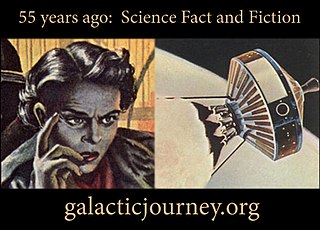
Galactic Journey is a science fiction blog and fanzine.
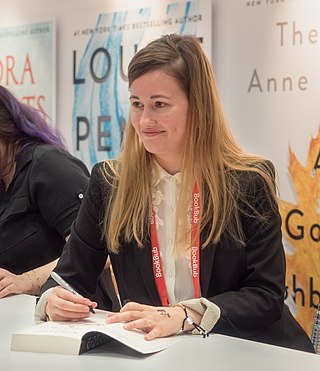
Tamsyn Muir is a New Zealand fantasy, science fiction, and horror author best known for The Locked Tomb, a science fantasy series of novels. Muir won the 2020 Locus Award for her first novel, Gideon the Ninth, and has been nominated for several other awards as well.
"The Steiger Effect" is a science fiction short story by Betsy Curtis. It was first published in Analog Science Fiction in October 1968.
References
- ↑ 1963 Hugo Awards, at TheHugoAwards.org; retrieved October 1, 2021
- ↑ Aug. 17, 1962: The 90% rule (September 1962 Fantasy and Science Fiction), by Gideon Marcus, at Galactic Journey , published August 17, 2017; retrieved October 1, 2021
- ↑ Introduction to Myrrha, in One and Wonder: Piers Anthony's Remembered Stories, published 2013 by Fantastic Planet Books